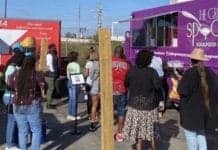
Part 1
by the People’s Minister of Information JR Valrey, SF Bay View Oakland Bureau
Allyssa Victory is a human rights and labor law attorney and a major progressive voice who has worked with the City of Oakland on a number of different projects that are important to Black and Brown communities over the years. After being tired of the never-ending bureaucratic bs, Allyssa Victory has thrown her hat into the arena of voters to be considered for the job of mayor of Oakland.
BlackNewWorldMedia.com is presenting a new series where we will explore some of the ideas of Oakland’s mayoral candidates, so that people can make more informed choices at the ballot box.
Allyssa Victory is definitely a mayoral contender with innovative ideas that may end up being Oakland’s first Black woman mayor. Check out what Alyssa Victory has to say to some very key questions that are relevant to Black and Brown Oakland.
JR Valrey: What made you want to become mayor of Oakland? Have you ever held public office?
Allyssa Victory: I am running to be the first Black woman mayor in Oakland. I was raised by this city to be a leader, organizer and advocate for justice. I am the daughter of a teacher and a product of public schools. I grew up in North Oakland with the influence of the Black Panther Party. I provided food and clothing distribution with my church in West Oakland. I worked my first job in high school for educational justice and equity with Oakland’s Youth Together.

I personally overcame many of the issues facing our most vulnerable residents, including evictions, homelessness and food insecurity. I have lived in every district of our city and witnessed decades of failed policies and leadership that are resulting in crises of homelessness, climate change, racial inequity and public safety. All of our crises can be addressed at the top through the strong mayor’s seat, which is legally separate from the legislative body of our City Council.
Our city originally started as a council-manager government, but cycles of elected leadership and ballot measures have moved us to one of the strongest mayor systems. The mayor’s seat has the power, control, staffing and resources to provide high quality services to our city or not and to implement the legislative will of council or to interfere with it. The strong mayor’s seat also has access to unique emergency powers.
I have been on a journey to become mayor ever since I returned to Oakland after college to pursue my law degree. My law degree is focused on government law and, as just a student, I provided policy advice to the cities of San Francisco and Oakland, externed at the federal courthouse in Oakland, and worked enforcing Oakland’s minimum wage ordinance with the City Attorney’s Office.
We currently have an illegal and unconstitutional Encampment Management Policy (EMP) being used to guide the city’s response to the ever growing encampments of unhoused residents attempting to survive on the streets.
Now as a licensed civil rights attorney, I spend every day representing Oakland’s workers and advising municipal governments across the state on public safety. I was publicly elected in the beginning of 2021 as an ADEM (Assembly District Election Meeting) delegate to the California Democratic Party for Assembly District 18 which includes Oakland, Alameda and San Leandro.
JR Valrey: Since you are a working human rights and labor law attorney, what issues specifically in the areas of human rights and labor law does the city of Oakland need to work on?
Allyssa Victory: To highlight a few:
While Oakland has made much progress and many investments in police accountability, our police department is still out of compliance with our settlement agreement in the Riders v. City of Oakland case, resulting from civil rights violations including racial profiling of Black Oaklanders and excessive use of force. After 18 years and in the midst of a public safety crisis, our city deserves a department that is fully compliant with its own legal settlement terms and all applicable laws in the fundamental area of constitutional policing.
We currently have an illegal and unconstitutional Encampment Management Policy (EMP) being used to guide the city’s response to the ever growing encampments of unhoused residents attempting to survive on the streets. When the EMP was first introduced, unhoused advocates launched a Care Not Harm campaign and identified numerous provisions in the existing city code that violate civil and constitutional rights.
. . . evictions are illegal during a pandemic where Oakland is still covered by an eviction moratorium.
The EMP is essentially redlining our most vulnerable residents out of our city. Much of the redlining pushes encampments to non-city owned lands, like BART and freeway underpasses, where residents are more at risk of eviction and harm. I’ve documented several times where residents living in RVs and cars were ticketed and threatened with towing by OPD, without any resources or services.
The city does not have enough shelter beds to evict residents, and evictions are illegal during a pandemic where Oakland is still covered by an eviction moratorium. This sets a dangerous precedent as other cities are following Oakland’s example with L.A. City Council adopting a measure, this year, to similarly redline homeless residents. We need a response to the housing crisis rooted in human rights.
In 2014, Oakland passed its own city-level minimum wage ordinance. In 2019, the city established the Department of Workplace and Employment Standards, envisioned to be a labor enforcement agency that parallels the state Labor Commissioner. Wage theft is the most widespread theft in our state. We must fully staff and resource our Enforcement Department, modeled after San Francisco’s Office of Labor Standards Enforcement, to ensure that our workplace laws and worker protections are actually enforced. I was proud to organize in coalition to push for the strongest implementation on behalf of the Bay Area Black Worker Center.
In September of this year, our City Council declared gun violence a public health crisis. Gun violence is the leading cause of premature death across the U.S. A public health response requires that we invest and focus on the health and well-being of Oaklanders as a means of violence prevention and reduction. Investments in education, social services, housing and expanded employment will all be included in violence prevention strategies.
JR Valrey: What are your views on keeping the A’s in Oakland? What do you think about the idea of building a new coliseum at Howard’s Point?
Allyssa Victory: The Howard Terminal project is a real estate development proposal that includes a ballpark. I participated in the city-sponsored 2020 community benefits agreement process, as part of the Jobs and Economic Development Sub-committee. The community process yielded a robust matrix of proposals to the A’s, all aimed at ensuring that the project benefits the public and adequately addresses community impacts.
The A’s proclaim that they are rooted in Oakland and now have the perfect opportunity to show it.
With all development and city contracting, I will champion robust community benefits, including the right of workers to unionize and local hire as well as ongoing assessment of community impacts. Though there has been a lot of momentum around the recent votes on non-binding term sheets, there are still extensive procedural steps required including the A’s response to the draft environmental impact report. The A’s proclaim that they are rooted in Oakland and now have the perfect opportunity to show it by working with the city to make the best use of public lands, for public good, including the current Coliseum site that they have leased for decades.
I must also view the Howard Terminal proposals with attention to our current active Port of Oakland, which is the fifth largest in the U.S and which already generates revenues for the City of Oakland. I champion equitable development throughout our city, using unionized labor to build, staff and maintain projects. The A’s current lease at the Coliseum will continue until 2024, so I look forward to working and negotiating with them.
JR Valrey: What are your views on bringing a WNBA team or some kind of other professional sports team to play at the Coliseum?
Allyssa Victory: I believe we are long overdue for investment in inclusive sports franchises and entertainment for our residents. I support bringing a WNBA team to the existing Coliseum facilities. The City will soon determine whether to grant exclusive negotiating rights to either of the groups proposing to develop and manage the Coliseum site. I also support expanded facilities for soccer, which is on the rise in our city with our Oakland Roots Soccer Team with a global audience.
The Coliseum and international airport district is Oakland’s tourist zone and largest economic engine. Over decades up to the present, this area has been divested, blighted and abandoned. The Coliseum currently includes a stadium, arena, massive parking and additional city-owned lots around the perimeter. It is accessible by air, Amtrak, pedestrian bridge, freeway and public transit.
The California Public Banking Option, passed as AB 1177 this year, will help to facilitate local public banking and announced many findings about the harms of private banks . . .
With planned transit expansions to the area, I will increase what the destination offers to maximize the use of our public lands and to generate the district’s full economic and cultural potential. With all development and city contracting, I will champion robust community benefits including the right of workers to unionize and local hire as well as ongoing assessment of community impacts.
JR Valrey: Oakland is known as the mecca of cannabis legislation, but it is also the mecca of the legalized new Jim Crow cannabis industry of today. What are you going to do to open up more opportunities for Black people in this industry?
Allyssa Victory: Our first round of official endorsements released includes Chaney Turner, an Oakland resident and Oakland’s Cannabis Regulatory Commission chair. I will work with our residents, the Commission, and equity advocates to ensure that those most impacted by mass incarceration and disenfranchisement before legalization are repaired and able to access the franchise.
Steps to opening up the industry include reforming our cannabis business tax, education on cannabis regulatory rules, affirmative assistance with and removal of barriers to permitting, and strengthening the city’s commitment to decriminalize cannabis. The City Council’s recent proposal to remove cannabis testing from all city employment is a step in the right direction. I will take common sense actions like these to orient our city to a circular economy that centers Oakland’s people and local businesses.
JR Valrey: Can you talk about your ideas around community banking and how that can benefit the Oakland economy with new revenue?
Allyssa Victory: I advised the cities of Oakland and San Francisco on creation of municipal bank, in 2015, as both cities were searching for a solution to the lack of funds for affordable housing and local business assistance. The California Public Banking Option, passed as AB 1177 this year, will help to facilitate local public banking and announced many findings about the harms of private banks, including predatory lending, expensive overdraft fees, and limited financial services and education.
Oaklanders should be able to own our communities.
I am committed to working with the City Council, Public Bank East Bay and others to implement the vision of a municipal bank. This will allow the city to control financing, to be a partner or leader on development projects, offer equitable lending to Oaklanders and local businesses and to better serve the cannabis industry which is often barred from banking services, due to the federal ban on marijuana.
JR Valrey: What are some of your ideas around dealing with the housing affordability problem in Oakland?
Allyssa Victory: Oaklanders should be able to own our communities. Oakland is one of the most expensive cities to purchase a home and to rent. Increased housing costs lock out first responders, teachers and service workers. We must ensure that we have housing to meet the range of income and wages of our residents. As mayor, I will work to build a wider spectrum of deeply affordable housing including social housing, worker housing, RV parks, and partnership with community land trusts.
As mayor, I will oversee the implementation and effective administration of our existing vacant property taxes, accessory dwelling unit permitting, and housing development impact fees to encourage use of residential land or to otherwise fund affordable housing projects. I support the repeal of Costa-Hawkins at the state level that will allow Oakland to pass local rent control measures. I will work in partnership with Alameda County and our regional housing tables to maximize local creative solutions until then. Economic and job development as well as safety net programs like a guaranteed basic income can also increase our residents’ ability to afford housing and other essential needs.
Our City Council adopted an Encampment Management Plan, which manages encampments and attempts to regulate the unhoused instead of providing rapid re-housing in shelter fit for humans.
JR Valrey: What are your ideas around helping the massive and ever-growing shantytowns of homeless people who live on the streets and need more public services?
Allyssa Victory: The explosion of shantytowns is the result of decades of failed leadership. Oakland has declared homelessness a local emergency every quarter since 2018, with an overwhelming majority estimated to be Black residents. I co-drafted the 2020 Oakland Black New Deal with tens of other community leaders that articulated immediate interventions such as stopping criminalization of the unsheltered, providing adequate PPE, access to potable water, and safe storage for personal belongings when being offered shelter. Our churches, non-profits and community organizers have stepped up to provide these ongoing resources.
Our shantytown crisis affects all areas of our public services: education, parks and recreation, public safety, health, climate and economic development. Our City Council also adopted an Encampment Management Plan which does just that: manages encampments in our city. The EMP attempts to regulate the unhoused instead of providing rapid re-housing in shelter fit for humans.
As mayor, I will stop responding with a policy that criminalizes homelessness or poverty. Having overcome homeless with my family, as a youth in the city, I will respond with solutions rooted in human rights, compassion and care for our most vulnerable residents. We need a housing first policy, to reflect the fact that all other interventions (drug rehab, mental health etc.) will be less effective while people remain unsheltered.
I will use the maximum extent of the emergency powers to expand emergency shelter beds and transitional housing. I will increase investments in homeless administration staff and resources, so that our budget reflects the priorities and needs of residents.
JR Valrey, journalist, author, filmmaker and founder of Black New World Media, heads the SF Bay View’s Oakland Bureau. He can be reached at blockreportradio@gmail.com or on Facebook. Visit www.BlackNewWorldMedia.com to read more.

 Store
Store












